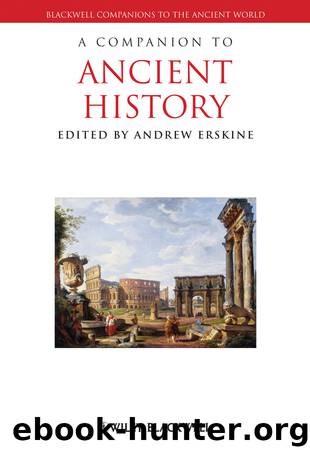A Companion To Ancient History by Andrew Erskine

Author:Andrew Erskine
Language: eng
Format: epub
Publisher: John Wiley & Sons
Published: 2012-10-24T16:00:00+00:00
3 What Does “Family” Mean?
While we might feel that we understand the tribulations and motivations at work in Demosthenes’ and Cicero’s family lives, we should be careful not to read twenty-first-century Western mores into ancient family structures. It is only in early modern times that the sense of the English word “family,” namely of the traditional and stereotypical triad of father, mother and children, which we dub the nuclear family, has emerged. The English term “family” derives from the Latin familia, but the Latin word actually means something else: not only parents and children (and in fact legally it might not even include the mother, as we shall see shortly) but also other kin, family retainers and even property (in the last category might be put slaves). Familia is best translated into English as “household,” as in the Roman emperor’s vast familia, including his freedmen and slaves. Familia in the Roman context meant all those people and things in the father’s power (potestas); the Romans – or at least the fathers among them, including Cicero – saw the institution of patria potestas, the total power of the oldest living male ascendant over all those in his familia, as fundamental to their way of life and as an object of considerable pride and satisfaction (Gai. Inst. 1.55; it is still being talked about in the sixth century: Justinian, Institutes 1.9.2). The Roman term domus (which can also refer to the physical abode) better conveys the modern idea of the nuclear triad, at least to the extent that it more regularly included the conjugal couple. The Greek word oikos also conveys the sense of a wider grouping, and like Latin familia is based around the male line (in Roman law the agnates). Our sense of the Greek household is based much more on a patrilineal line (a reflection of its endogamous basis), and the Athenian family appears much more patriarchal than the Roman, despite the fact that the Athenians did not have an institution which equates with patria potestas. This Athenian male dominance is a reflection of the gendered nature of the society and the sources, with less evidence (than in the Roman context) that illustrates women’s ability as a group to act outside the patriarchal arena (though sometimes circumstances might dictate otherwise: Kleoboule was unusual, Terentia was less so). In Aristophanic comedy, for instance, women are depicted as acting independently, but this is not meant to be viewed as a typical scene from daily life: it is comic precisely because it is (to a male audience at least) extraordinary.
Download
This site does not store any files on its server. We only index and link to content provided by other sites. Please contact the content providers to delete copyright contents if any and email us, we'll remove relevant links or contents immediately.
| Books & Reading | Comparative Literature |
| Criticism & Theory | Genres & Styles |
| Movements & Periods | Reference |
| Regional & Cultural | Women Authors |
4 3 2 1: A Novel by Paul Auster(12372)
The handmaid's tale by Margaret Atwood(7757)
Giovanni's Room by James Baldwin(7325)
Asking the Right Questions: A Guide to Critical Thinking by M. Neil Browne & Stuart M. Keeley(5757)
Big Magic: Creative Living Beyond Fear by Elizabeth Gilbert(5754)
Ego Is the Enemy by Ryan Holiday(5413)
The Body: A Guide for Occupants by Bill Bryson(5080)
On Writing A Memoir of the Craft by Stephen King(4931)
Ken Follett - World without end by Ken Follett(4723)
Adulting by Kelly Williams Brown(4565)
Bluets by Maggie Nelson(4547)
Eat That Frog! by Brian Tracy(4525)
Guilty Pleasures by Laurell K Hamilton(4439)
The Poetry of Pablo Neruda by Pablo Neruda(4097)
Alive: The Story of the Andes Survivors by Piers Paul Read(4018)
White Noise - A Novel by Don DeLillo(4002)
Fingerprints of the Gods by Graham Hancock(3995)
The Book of Joy by Dalai Lama(3976)
The Bookshop by Penelope Fitzgerald(3844)
